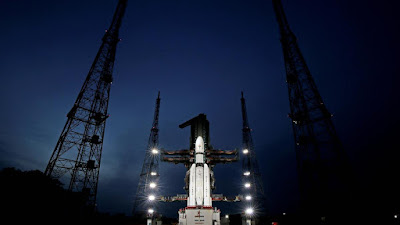Countdown for Chandrayaan-3 launch from Sriharikota will begin on July 13 afternoon :The space agency will launch Chandrayaan-3 by LVM3 rocket at 2.35 pm on Friday, July 14, 2023.
The countdown for the launch of Chandrayaan-3, India’s third lunar exploration mission will begin on Thursday afternoon .Indian Space Research Organisation (ISRO) will commence the 26-hour countdown at 1.05 pm at the Satish Dhawan Space Centre in Sriharikota.
The space agency will launch Chandrayaan-3 by LVM3 rocket at 2.35 pm on Friday. Updating on the mission, ISRO said that the propellant filling is in progress. The Mission Readiness Review for the launch has already been completed and the board has authorised the launch.
The countdown to the Chandrayaan-3 mission has begun. The country is eagerly awaiting this historic launch. The Indian Space Research Organization (ISRO) will launch it on July 14.
Chanda mama far ke,..since childhood we have been visiting Chanda mama, listening to the song, that Chandamama who is the closest planet to us in the sky. But from the scientific point of view, there are many secrets hidden in Chandama. The countdown of our ISRO's biggest mission Chandrayaan-3 has started to overcome this Chandamama. Why is this Chandrayaan mission so important for India, what information will the scientists get if this mission succeeds, why an earlier mission failed. You will get the answer to all this in this article.
Date 14 July, 2.35 pm time, this is the time and date when our space agency ISRO will launch Chandrayaan-3 from Satish Dhawan Space Center in Sriharikota. This is not only ISRO's mission, but it is a mission with which crores of Indians are attached. There is a dream, which every Indian waits for years to fulfill. Not only Indians but the whole world is watching this Chandrayaan-3. This is because the lander Vikram of Chandrayaan-2 mission sent in July 2019 was destroyed and the mission failed. However, after learning something from this failed mission, ISRO is ready to wave the flag of success this time.
So far, many countries of the world have sent missions to the moon, but ISRO's Chandrayaan-3 will reach and explore the dark side of the moon, which still has many mysteries, where humans have not yet reached. After landing here, the rover of Chandrayaan-3 will send pictures of the lunar soil, examine the soil there, give a report on the atmosphere on the moon, chemically analyze the lunar soil and get detailed information about the minerals.
The moon has two parts, one part is always light, while the other part is always dark. ISRO's mission to explore dark space will be the only country to do so. ISRO's Chandrayaan-3 lander mission will land 100 km away from the Chandrayaan-2 crash site, a part of the moon that is hit by the sun's rays, causing the temperature to reach minus 180 degrees. The chances of getting water at this place increases.
What is special about this mission?
After the failure of Chandrayaan-2, ISRO has learned a lot from it and prepared Chandrayaan-3. This time Chandrayaan-3 will not have an orbiter as Chandrayaan-2's orbiter is still orbiting the Moon. This time the propulsion module has been installed in place of the orbiter. Which will help in navigation during soft landing of Chandrayaan-3 lander. The Chandrayaan-3 mission consists of three parts of the module.
Propulsion Module – the part that makes the spaceship fly.
Lander module – the part used to land a spaceship on the moon.
Chandrayaan 3 Launch: ચંદ્રયાન-3નો હેતુ શું છે, જાણો, ચંદ્ર પર સેફ લેન્ડિંગ બાદ શું કરશે કામ
Chandrayaan 3 ISRO: ચંદ્રયાન-3 અંગે ઇસરોએ કહી મહત્વપૂર્ણ વાત, ચંદ્રયાન-2 કરતા કેટલું આધુનિક છે? જાણો વિગતવાર
Rover – This is the data collection part of the Moon.
This time Chandrayaan-3 mission has more sensors, software changes. Chandrayaan-3 with its propulsion module weighs 2 thousand 148 kg. The Vikram lander, which weighs 1,726 kg, will also carry a 26 kg rover. 4 payloads will also be sent along with the lander.
So finally let us tell you that the help of LVM-3 will be taken to launch Chandrayaan-3. This is the rocket launcher of Isro in which every launch has been successful. LVM-3 will place Chandrayaan's integrated module in a parking orbit of 170 km x 36,500 km Earth orbit, after which Chandrayaan-3 will exit Earth orbit and proceed towards the Moon.
So in simple words, Chandrayaan will not go directly towards the moon but will move towards the moon in different stages.







